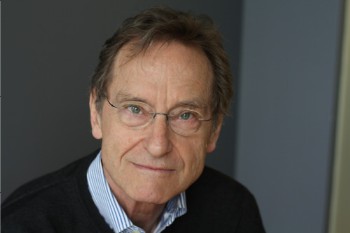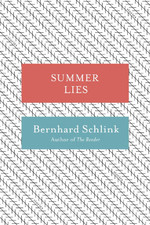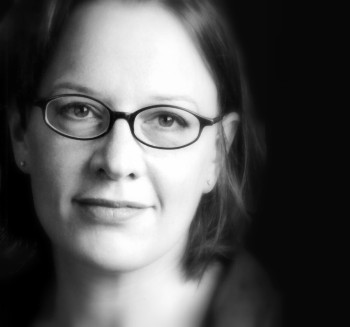Book Feature: Authors Bernhard Schlink and Joyce Hackett on the Craft of Writing and Writing About the Past
Sponsored by the Harvard Writing Program and the Harvard Summer School, the event was introduced, perhaps humorously, to the audience as a “meeting of German–American relations.” In reality, it was a more of a showcase in differences about each country’s historical imagination.
By Christopher M. Ohge

Bernhard Schlink, author of THE READER — He believes that history (and literary history) is not fair.
On Wednesday, July 25, German law professor and novelist Bernhard Schlink made a low-key appearance at the Barker Center at Harvard University to discuss his craft with American novelist (and Wellesley alumna) Joyce Hackett, whose first novel, Disturbance of the Inner Ear, won the 2003 Janet Heidinger Kafka Prize.
Sponsored by the Harvard Writing Program and the Harvard Summer School, the event was introduced, perhaps humorously, to the audience as a “meeting of German–American relations.” In reality, it was a more of a showcase in differences about each country’s historical imagination.
Tall and slender, Schlink walked into the room with a matter-of-fact gait, business-like but comfortable enough that the empty sleeves of his light brown blazer lay over his shoulders like wings. His arms and hands moved excitedly beneath. He read for the small yet eager audience from his essay “Guilt About the Past,” which asks, How does one write responsibly about past, and are there specific rules for historically oriented fiction?
“I don’t think about the reader,” he enunciated softly and painstakingly after the reading, which sounded strange because his talk was about The Reader, an international bestseller, controversial for its portrayal of the generation that was responsible for the Third Reich. But in this case he emphasized that his greater concern lay with craft and content—that is, using a compelling plot as a catalyst, writing clear sentences and telling the truth. What he meant by the truth was a curious aspect of the talk.
During the reading, he took issue with Adorno’s claim that “Nach Auschwitz ein Gedicht zu schreiben, ist barbarisch” (To write a poem after Auschwitz is barbaric). To reject poetry as a vehicle of meaning after the Holocaust, Schlink maintained, shows little faith in the reader to imagine the “whole picture.” The author provides the whole picture, not as a condition of genre but a condition of authenticity. Adorno’s claim also shows too much faith in the power of social norms and too little understanding of the tendency of society to erase the memory of past atrocities.
In keeping with many of the themes of classic German literature, he frequently mentioned the genre of the fairy tale. One example was the 2006 film Das Leben der Anderen (The Lives of Others), which helped to reconcile the once divided countries of West and East Germany. Here he suggested that this fairy tale’s truth comes from its “healing power.” The film portrays an East German Communist worker spying on a fellow countryman, who is also a playwright. Once he becomes acquainted with the other man’s life, the spy gradually becomes empathetic and attempts to help the dramatist. This atypical, mythical story came off as “authentic,” even if it did not actually happen, to post-GDR Germans and to cinema audiences internationally. “What appears typical is no guarantee of truth,” Schlink asserted after discussing the film.
How can one describe the impulse to create fairy tales and myths? In his writing, Schlink strives to create “precious images of events” that are full of contradictions and tension, so that one arrives at a “complete image.” “I don’t believe in avoiding the tension,” he said. Truth is not presented by what is typical; consider how nation-building or religion-founding myths hold people together without presuming to be the whole truth. The work of art, for him, opens our eyes to something that happened or could have happened. Reading is a means of sharing others’ experience, tensions and all. The truth is not always pretty, nor is it always reassuring.
At the close of Schlink’s reading, Hackett asked whether he had any idea that The Reader would cause so much furor. He replied, “I had to write the book,” despite his fear that his publisher might prefer another of his mystery novels. His quest as a novelist was to create a representative narrative, not only to his generation, born in the immediate aftermath of World War II, but also to the generation of his grandparents, who were complicit in Nazi atrocities. To imagine the past and represent one’s generation—that is the struggle.
During his reflections on writing The Reader, he confessed he has changed his mind about his approach to writing during the process: the books that followed (such as The Weekend) were no longer mystery novels but focus on the trope of terrorism as a chamber play (Kammerspiel). With its insistence on psychological depth and revelation through conversation, his work ponders the nature of the terrorist and the society that provides the conditions that nurture that kind of violence.
Both Schlink and Hackett agreed that while parents tend to convey history through rules that are meant to be protective, such rules may not be applicable to their children’s lives.
Hackett then read from the prologue of her novel-in-progress, Reconstruction, a novel about Frederick Douglass and his Jewish mistress that takes as its theme the reconstruction of the self, rather than the era itself. She transported us to August 1847, when Douglass was about to leave William Lloyd Garrison. On the move to Rochester to co-opt his friend Martin Delaney to co-edit his newspaper The North Star, Douglass was also about to meet Susan B. Anthony, who never quite warmed to Douglass.
Hackett’s view of historical fiction is decidedly less specific than Schlink’s; she aims to write “in between” what is known to be factually accurate, and she is not interested in writing history. Unlike Schlink, who feels a great responsibility in representing traumatic events from the European past, Hackett did not initially want to write about two historical figures who were so important to American civil rights. Nevertheless, Hackett’s novel eventually morphed into an exploration of why women’s rights, led by Anthony, lagged behind Douglass’s cause of African-American rights.
The questions that continue to elude novelists, both German and American, are how do parents—and writers, for that matter—convey their history to succeeding generations, and how do the children interpret these stories?
“Shouldn’t historical novelists be peer-reviewed, like historians?” asked one opinionated interlocutor during a brief but spirited question-and-answer session. “I’m just a writer. I’m not a literary critic,” Schlink said, with a smile, before asserting that history (and literary history) is not fair. “History is the shape we give the past.”
Chris Ohge’s review of Schlink’s The Weekend (PRI’s The World).
Joyce Hackett on grave shopping in Berlin (NPR).
Tagged: American literature, Bernhard Schlink, German literature, Joyce Hackett


